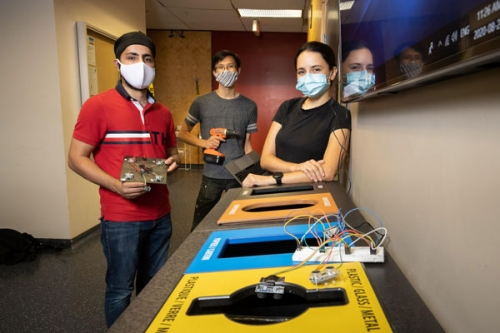Status: ONGOING July 2019 -
We seek to develop a smart sensor-equipped waste bin, to monitor waste habits and encourage the public to adopt better waste habits and reduce recycling contamination on campus.
Project Number |
SP0227 |
Budget |
$4,000 |
Campus |
Downtown |
Application |
|
Final Report |
|
Contact |
kirklann.lau [at] mail.mcgill.ca |
Read the full project description
We want to develop and implement an eco-station that monitors waste habits at McGill and seeks to educate about proper recycling. The flagship installation would integrate into pre-existing waste infrastructure (eco-stations in McConnell) with motion sensors, weight sensors and screens installed above waste bins. Data and recycling habits will be collected at select locations on-campus to be communicated to a microcontroller integrated inside the waste station. Individual would arrive with their waste at the bin and with comprehensible and active signage, dispose of their trash accordingly. The screens above the trash bins serve to inform and educate the individual and the general McGill community about real-time changes in waste data in addition to encouraging better recycling habits. Sensors integrated into each separate bin will collect data about waste habits. Weight sensors will monitor how full a bin is, then transmit the data to the cloud for operational optimization by grounds staff. The sensor system will be modular, discrete, and sturdy to avoid tampering and vandalism. Screens will be protected behind impact-proof plexi-glass. Technical work will be handled by a MechEng capstone team of 4 students, with assistance from Building and Grounds.
Smart-waste devices already exist on the market, and appear to be quite successful in being adopted. However, these systems are often large and very expensive units that cannot be scaled across campus and cannot be integrated with existing infrastructure. Many of these smart-waste systems do not stress education and try to hide the waste sorting process from users. Other monitoring systems meant for citywide use offer simple waste fill-level monitoring, but these solutions do not provide the valuable weight data that McGill's Building and Grounds department needs.
Initially, we wanted McGill's food suppliers to eliminate bad packaging. Long talks with stakeholders showed us the reality of food supply. It's a complex chain. At every step, competing interests and compromises determine what sells. McGill is in its early stages of changing its recycling habits and our solution is intended to complement these efforts by encouraging conscious waste separation and guiding the community towards more circular systems and mindsets. We wrote surveys, we sorted garbage – we learned first-hand just how linked suppliers, consumer habits, and education are. We saw convenience was both our worst enemy for consumption, and our best weapon as designers. Ultimately, this problem is about everyday habits.
View photos


Connect with this project
|
